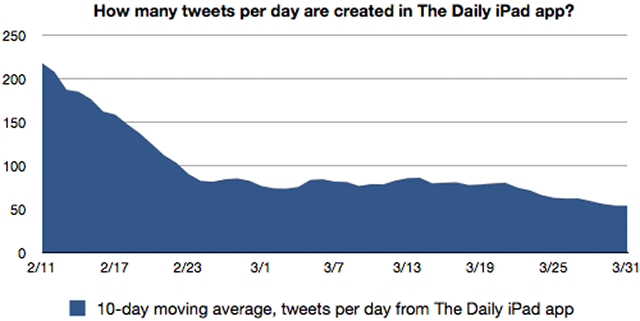A Brief History of the Murdoch/MySpace Disaster
Maybe MySpace was doomed from the beginning. The layout was horrific, the experience was sloppy, and they even made you learn basic html in order to put sparkly animated gif backgrounds on your ugly profiles. If you’re like me and everyone else, once Facebook came along and provided a clean, clutter free, spam free alternative, you flipped the switch in a heartbeat and never looked back.
MySpace, to put it bluntly, sucked. I barely remember the experience, and, like you, I have no desire to relive it.
However, what I have every desire in the world to relive is the story of how Rupert Murdoch lost $580 million investing in and then completely mismanaging it.
The Guardian: Dead in a Decade?
Has the Guardian been making £226 more per reader in annual ad revenues than they were during their print heyday? Of course they haven’t. Yet as the above graph provided by Malcolm Coles shows, this is the difference in the amount of money he’s been giving them to read their paper every year.
And it isn’t because he’s been cheating. He’s simply replaced his daily newsprint habit — which he estimated was running him £230 a year — with their £4 (one time fee) iPhone app and free website. With the Guardian’s circulation numbers falling to an all-time low of 200,000, one can only wonder how much longer the paper can keep this business model alive.
Only Fifty People Per Day Twittering About The Daily
It took a few long minutes of staring at the above graph to realize it wasn’t being scaled. As in, each tweet doesn’t represent one thousand tweets, or one hundred tweets, or even two tweets. There are literally fifty people per day — FIFTY — tweeting about The Daily articles from their iPads.
There is almost no end to the delightfully petty amount of ways I can put this staggeringly low number in context for you.
Just Like All of Their Readers, Vice Now Has a Trust Fund
Vice Magazine continues to become one of the most unlikely mainstream crossover stories of the 21st Century. What was once a local Canadian monthly run by recovering and/or not recovering heroin addicts focusing on informative topics like injaculation has become an international empire. Boasting 750 employees in 34 countries with a circulation of 1.1 million and offshoots into industries like advertising, music recording and television, Vice has done what many consider to be largely impossible — held the attention of a hipster audience for more than a single season.
With a new massive round of fundraising to the tune of tens of millions of US dollars from the like of Viacom and WPP, Vice has become bedfellows with some of the largest media companies in the world. This is amazing news for the hipster bible, giving them the liquidity to expand into the massive “emerging markets” of China, India and Brazil.
Journalism Students Create Hyperlocal News Sites, Learn Hyperlocal News Lessons
Remember when “hyperlocal” news used to be called the far less sexy but probably just as accurate “local” news? But then “local” became synonymous with “nobody reads this shit” and in order to lure student journalists away from the fast paced and exciting world of gossip blogging they had to invent an exciting new prefix to make local seem cutting edge and fast paced instead of geriatric and arthritic? Those were the days!
Time Out London Launching New Email Spamming Service to Compete With Groupon
The programme promises exclusive discounts, deals and savings, so pretty much the exact same thing as every Groupon clone in existence. The only difference? These deals will be hand picked by Time Out! Which is not a selling point!
Excerpts From the First Ever English Agony Aunt Column
The Awl unearths “Athenian Society” — the mother of all Agony Aunt columns that ran in London from 1691 to 1697.
The Guardian Trying to Make Another Splash in States
The paper is hiring — that’s right, HIRING — a new US editor. Will the fourth time prove to be the charm for the people’s paper?
Google Launches New Online Magazine
With Think Quarterly, Google’s new UK based web publication, the search giant makes its first move away from curating content to producing it — giving us all an insider’s view of what makes Google tick in the process.
Meet The Lady’s First Ever Astrologer!
Britan’s oldest women’s weekly introduces the first star gazer in their 125-year history — humourist blogger extraordinaire, Madame Arcati.
Snipe Highlights
Some popular articles from past years
- Margaret Thatcher statue rejected by public
- Number of people using Thames cable car plunges
- Could red kites be London's next big nature success story?
- Hope and despair in Woolwich town centre
- Only 16 commuters touch in to Emirates Air Line, figures reveal
- A unique collection of photos of Edwardian Londoners
- The five spookiest abandoned London hospitals
- Peter Bayley has worked for 50 years as a cinema projectionist in East Finchley
- Random Interview: Eileen Conn, co-ordinator of Peckham Vision
- An interview with Desiree Akhavan
© 2009-2024 Everywhen Ltd.






